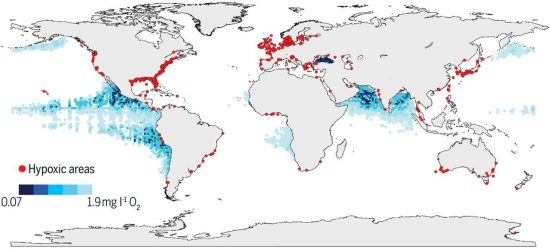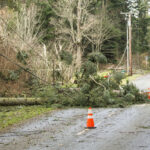January 5, 2018 – Deoxygenation is a growing problem in the ocean. The cause is human. It is our waste and activities that is consuming oxygen through biogeochemistry. The implications for coastal fisheries will become more apparent in the coming decades as marine species used for a major source of food in the Developing World disappear.
Oxygen is essential to ocean life and the chemical processes that occur there. But measurements at sites along coasts and in the mid-ocean are showing that several million square kilometers and hundreds of coastal sites show oxygen concentrations that are significantly lower than they should be to support abundant marine life.
Global warming is playing its part. Greenhouse gases, particularly carbon dioxide (CO2) are getting absorbed by ocean surface waters increasing acidity. Other gases like nitrous and sulfur dioxide are changing the biochemistry as well. And then there is fertilizer runoff injecting phosphorus and even more nitrogen into coastal ocean waters. And finally, there is the effluent from coastal cities and from communities along rivers that continue to pollute.
Today the ocean is a carbon sink, absorbing the CO2 we put into the atmosphere. In the near future, the ocean may turn into a net emitter of nitrous oxides contributing to atmospheric warming.
The map below illustrates coastal hypoxic areas seen in red as well as levels of deoxygenation along coastlines and in open ocean areas. It is a troubling picture.

The solution is staring humanity in the face. To fix the ocean we have to do the same things we need to do to fix the air: reduce greenhouse gas emissions and other air pollution. And in addition, we have to stop using the ocean as a giant sewer for our activities.
















